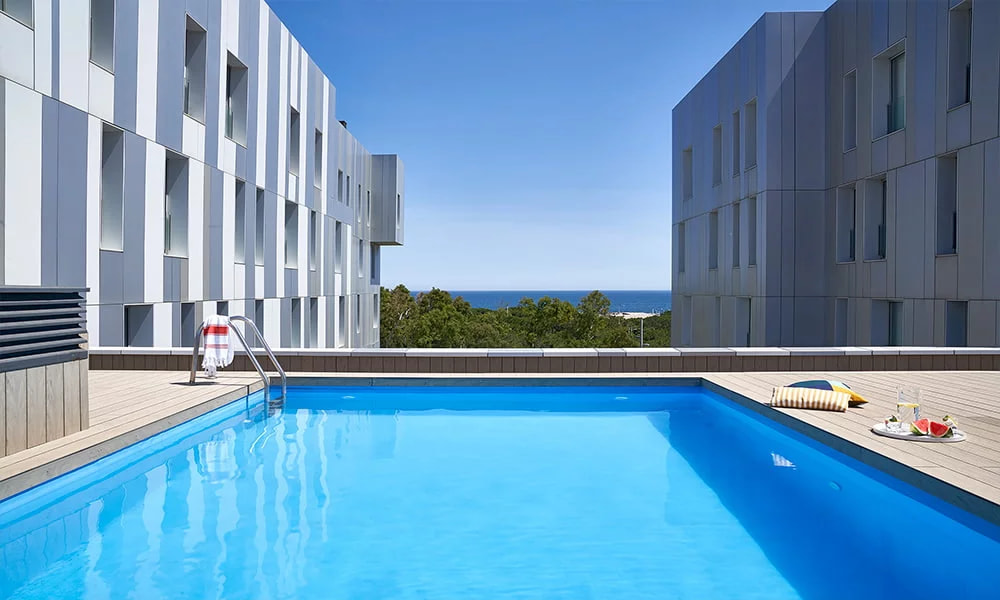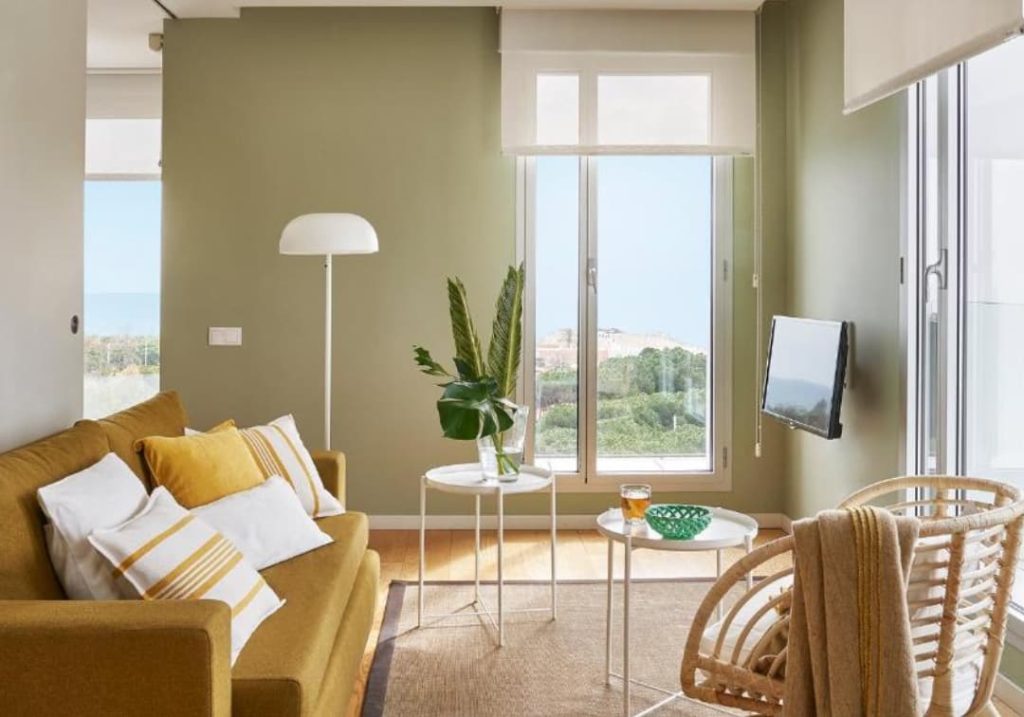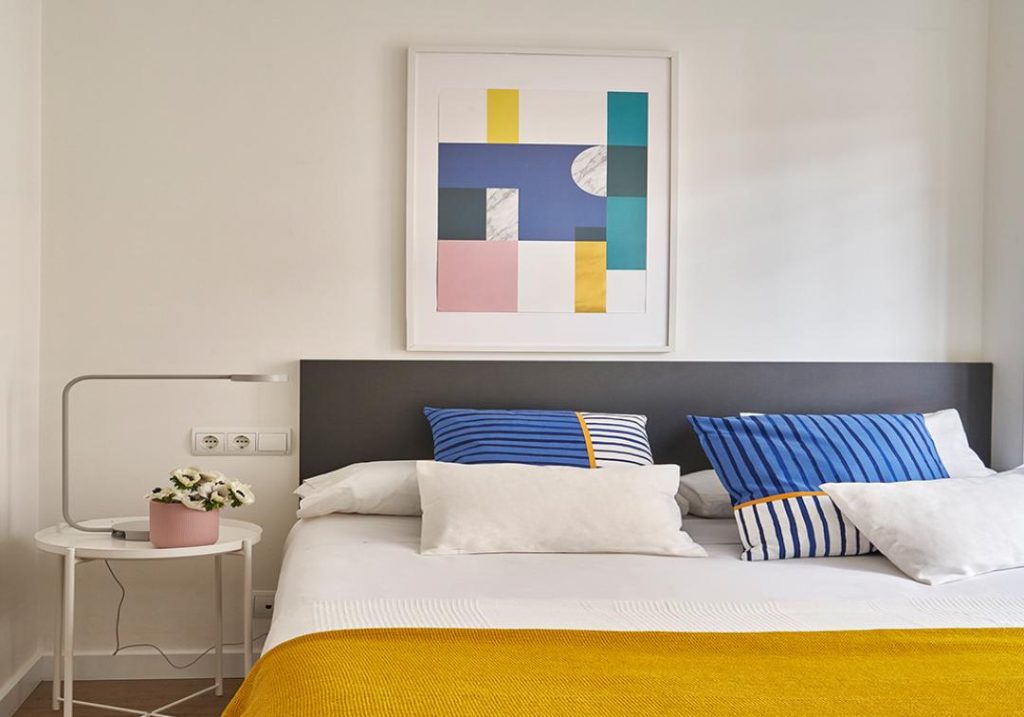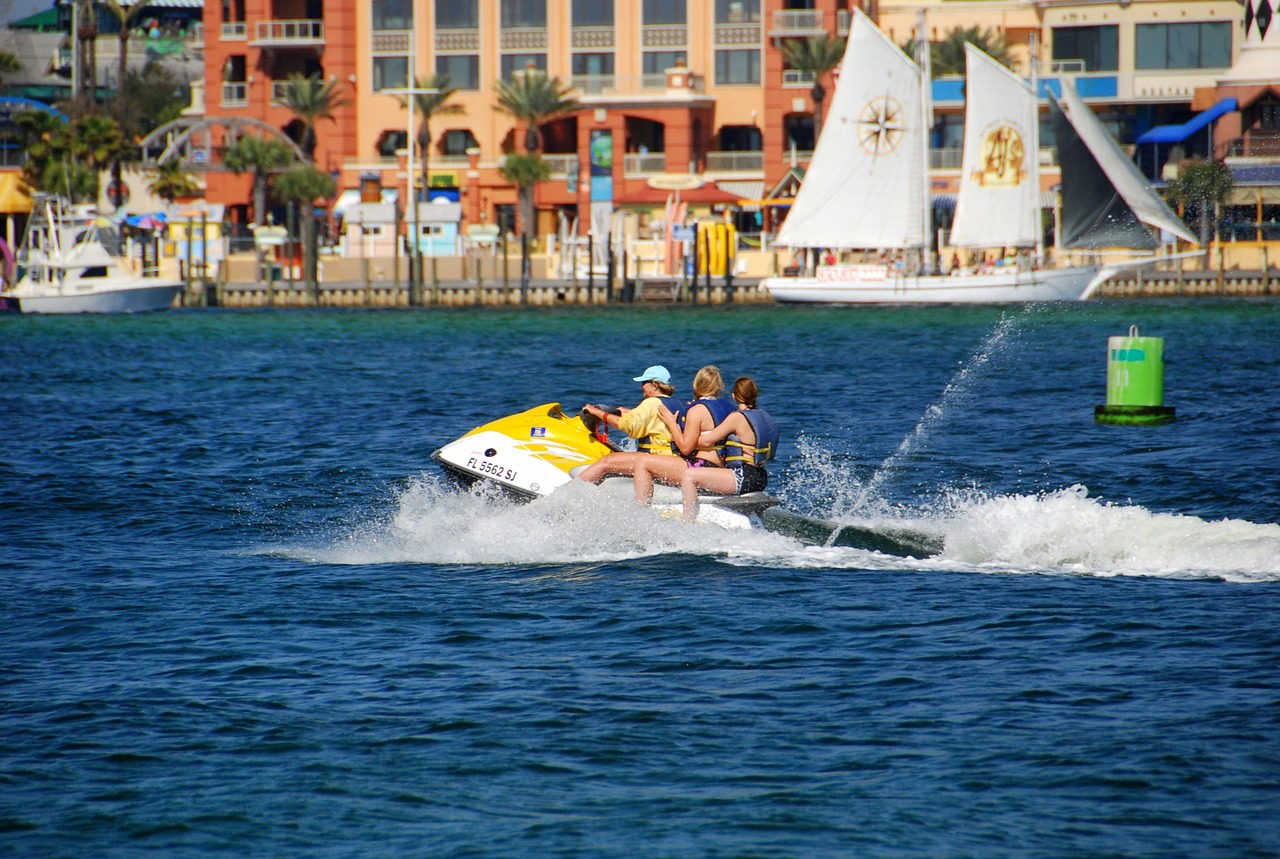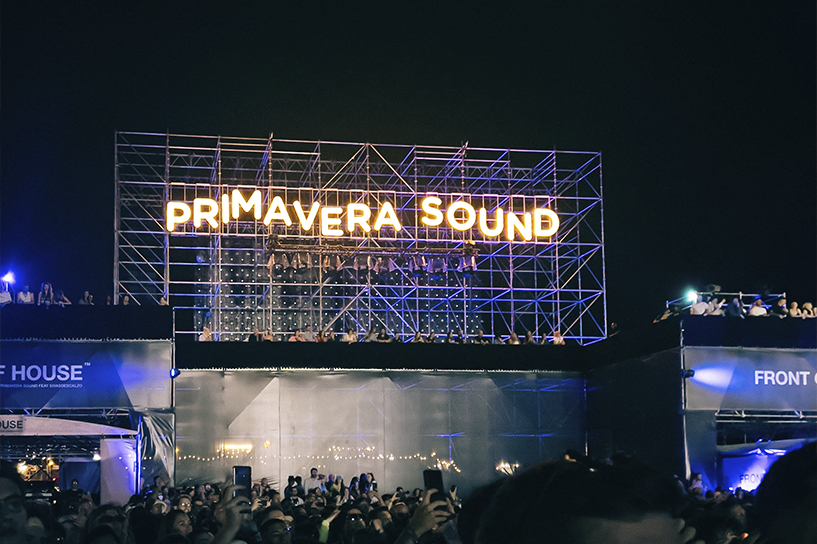- 1 Cost of living in Barcelona: What to include in your monthly budget
- 2 Neighbourhood by neighbourhood: Discover the best areas to live
- 3 Public transport: How to easily get around the city
- 4 3 useful tips for getting Around Barcelona
- 5 Practical Tips: Procedures and Documentation Needed to Settle
- 6 What you need to obtain a NIE or legal document
Are you considering a move to Barcelona? Excellent choice! The city offers a variety of opportunities and is an incredibly welcoming place to live. With its beautiful beaches, delicious food, vibrant culture, and friendly people, your new life will be exciting and, let’s not forget, incredibly fun! 😉

But what should you consider when moving to Barcelona? At Lugaris, we’ve compiled a comprehensive guide with everything you need to know before making this move. Spoiler alert: you’ll absolutely love living in this city.
Cost of living in Barcelona: What to include in your monthly budget
To move to Barcelona, it’s essential to understand the cost of living to plan accordingly. Here are some key aspects to consider in your monthly budget:
- Rent: Rental prices can vary significantly depending on the area. For example, prices are usually higher in central areas like Eixample, Poblenou, or Gràcia than in areas farther from the centre. The average rent in Barcelona today is between €800 and €1000 (depending on the area, property features, etc.). At Lugaris, you’ll find apartments in Poblenou, an ideal neighbourhood if you’re looking for apartments by the beach in Barcelona.
- Food and groceries: Food expenses can be moderate if you shop at local supermarkets or neighborhood markets. Prices may vary, but you can typically keep your weekly grocery bill between €30 and €50 per person.
- Transport: Barcelona has an excellent public transport system, including metro, buses, and trains. Monthly pass costs vary by zone, but if you choose Zone 1 for city travel, a 10-trip ticket costs around €12, and a single ticket €2.55.
- Entertainment: Barcelona offers a wide range of cultural and leisure activities. Prices can range from free (like visiting parks or museums on specific days) to paid entries for events and shows.
- Utilities and other expenses: These include electricity, water, gas, internet, and phone. These costs can vary but are an essential part of the monthly budget.
- Taxes: Consider local and national taxes, such as the Income Tax (IRPF), Property Tax (IBI) if you own property, and other municipal taxes that may apply.
- Education: If you have school-age children, include education costs, whether in public, international, private, or charter schools.
- Personal lifestyle: Finally, your lifestyle and personal preferences will influence your monthly budget. For example, if you play sports or have hobbies requiring equipment or memberships, include these expenses as well.
Neighbourhood by neighbourhood: Discover the best areas to live
When moving to Barcelona, choosing the right area is also important. Each neighbourhood has its charm and unique characteristics.
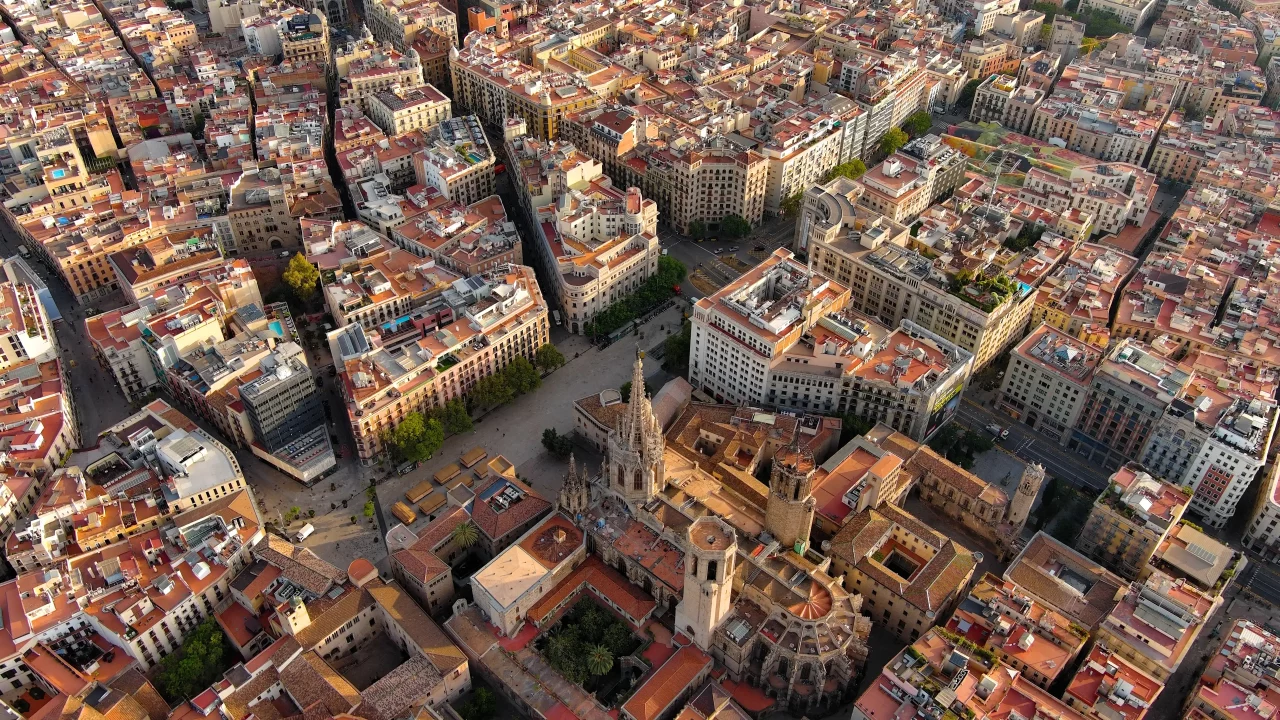
Here are some of the most popular neighbourhoods to live in Barcelona:
- Eixample: Eixample, known for its modernist architecture, is centrally located and well-connected. It’s perfect for those who want to be close to the city centre and enjoy shops, restaurants, and cultural life. At Lugaris, we offer many apartments in this popular neighbourhood. Check out our long-stay apartments in Barcelona here.
- Gràcia: A bohemian and lively neighbourhood, Gràcia has charming squares, local markets, and a unique atmosphere. It’s perfect for those who prefer a quieter environment but with easy access to the centre.
- Poblenou: Known as the “design district,” Poblenou has undergone an impressive transformation in recent decades. Originally an industrial area, it is now a modern neighbourhood with a young and international vibe.
- El Born: With narrow, historic streets, El Born is a culturally rich neighbourhood, ideal for art, fashion, and food lovers, with many trendy bars and restaurants.
- Sant Antoni: This neighbourhood has gained popularity in recent years for its authentic atmosphere and renovated modernist market. It’s an excellent option for those looking for an authentic local life with access to markets and traditional shops.
- Poble Sec: Located at the foot of Montjuïc, Poble Sec is known for its quiet, multicultural atmosphere. It’s ideal for families and those seeking a diverse community with quick access to the city centre.
- Sarrià-Sant Gervasi: One of Barcelona’s most exclusive and residential neighbourhoods, Sarrià-Sant Gervasi offers tranquillity, safety, and fresh air thanks to its green spaces. It’s perfect for families.
Each neighbourhood in Barcelona has its own unique personality and lifestyle, so choose the one that best matches your personal preferences and needs.
Public transport: How to easily get around the city
Getting around Barcelona is relatively easy thanks to its public transport system. Here are the most common options for moving around the city:
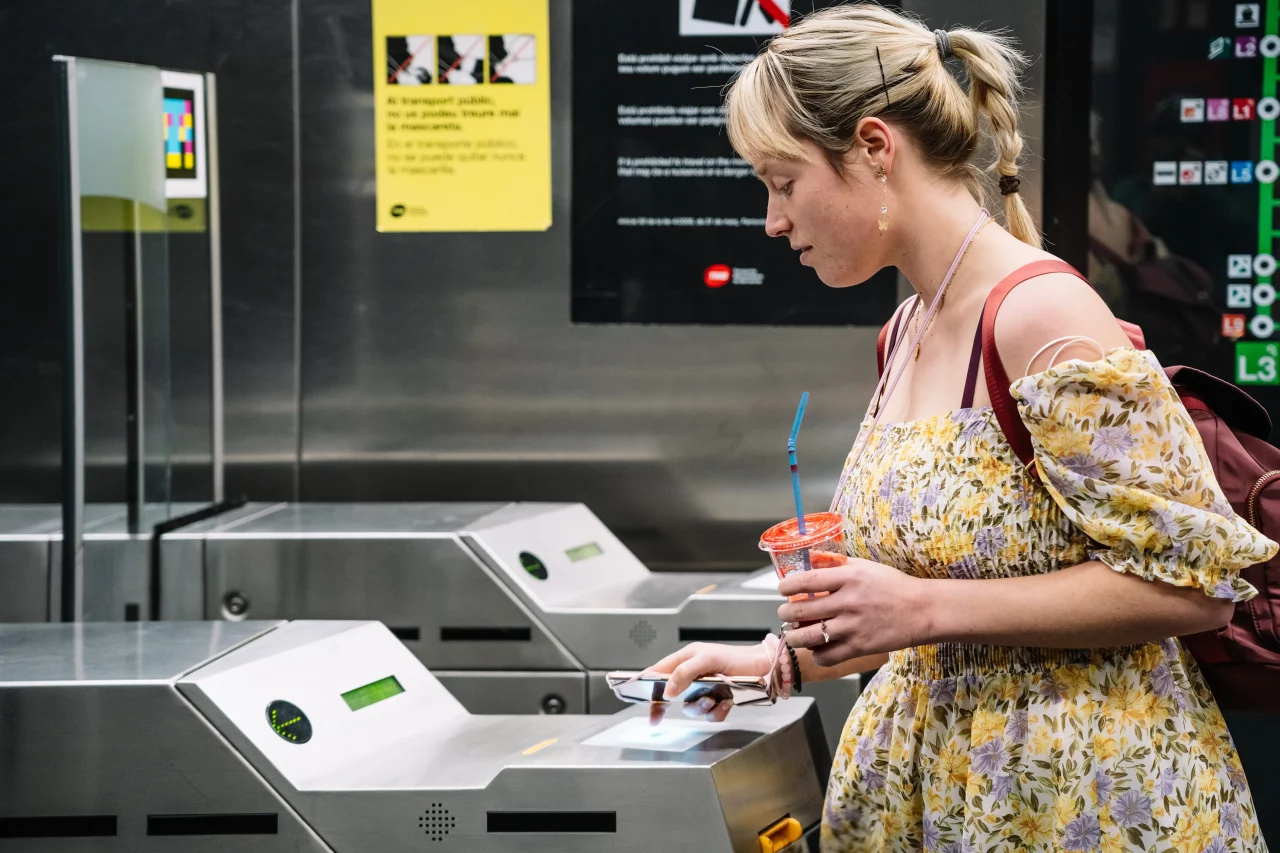
- Metro: Barcelona’s metro is fast and extensive, with several lines covering the entire city and its surroundings. It’s ideal for quick trips between different neighbourhoods and points of interest.
- Bus: The bus network is very comprehensive and complements the metro. There are numerous routes connecting all corners of the city, including areas not accessible by metro.
- Tram: Barcelona has tram lines mainly serving peripheral areas and certain neighbourhoods like Poblenou and the Diagonal Mar area.
- Cercanías (Renfe): For trips outside Barcelona, the Cercanías service connects the city with nearby towns and suburban areas.
- Bicing: Barcelona offers a bike-sharing system called Bicing, ideal for short trips within the city centre. It’s very popular among residents and visitors.
- Taxis and ride-sharing services: Taxis are readily available in Barcelona and offer a convenient option for quick trips or travel outside public transport hours. Additionally, services like Uber and Cabify are also available in the city.
To use public transport frequently and economically, you can purchase the T-Casual card, which allows 10 integrated trips on metro, bus, and commuter trains. There are also monthly and annual passes offering additional discounts.
3 useful tips for getting Around Barcelona
- Download mobile apps like “TMB App” or “Moovit” to check routes and real-time schedules, and plan your trip.
- Avoid driving in the city centre if possible, as traffic can be intense, and there are circulation restrictions.
- Take advantage of bike lanes and pedestrian areas to move safely and sustainably.
Practical Tips: Procedures and Documentation Needed to Settle
Moving to Barcelona requires some procedures and documentation. Here’s a practical guide:
- Visa and residence permit: If you’re a citizen of a non-EU country, you may need a long-term visa or residence permit to live in Spain. The required documentation may vary depending on your country of origin and the reason for your move (work, study, etc.). It’s advisable to check with the relevant Spanish consulate before travelling.
- Registration in the municipal census: Once you arrive in Barcelona and have a place to live, you must register at the corresponding City Hall. This procedure is done at the Citizen Service Office (OAC) of the district where you will live and is necessary to access certain public services and benefits.
- Foreigner Identification Number (NIE): The NIE is a tax identification number for foreigners needed to perform administrative and financial procedures in Spain, such as opening a bank account, signing rental contracts, working legally, etc. You can apply for it at the Foreigners’ Office or the police station.
- Social security and healthcare: If you plan to reside permanently in Barcelona, it’s advisable to register in the Social Security system to access public health services. This is done through the General Treasury of Social Security (TGSS).
- Opening a bank account: To manage your finances in Spain, opening a local bank account is useful. You will generally need your NIE and proof of address in Barcelona (such as a rental contract) for this procedure.
- Rental or property purchase contract: If you plan to rent or buy property in Barcelona, ensure you have all the necessary documents and understand the contract terms before signing. This includes the security deposit, contract duration, responsibilities, and rights as a tenant or owner.
- Other specific procedures: Depending on your personal situation, such as studies, work, or entrepreneurship, you may need to meet additional requirements. This could include enrolling in universities, obtaining specific work permits, or completing commercial registrations if you plan to set up a business.
It’s advisable to start these procedures in advance before your move to Barcelona to ensure you meet all the necessary legal requirements.
What you need to obtain a NIE or legal document
The Foreigner Identification Number (NIE) in Spain is essential for performing administrative, financial, and legal procedures. To obtain it, you need to follow these steps and have the following documentation:
- Application form (EX-15): This form must be properly completed and signed. You can download it online or collect it from the Foreigners’ Office or police station.
- Valid passport and copy: You must present your original passport and a complete copy of all pages, including the personal data page and the page with the entry stamp to Spain (if applicable).
- Justification for the application: Depending on your situation, you must provide documents that justify your reason for requesting the NIE. For example, for work purposes, you would need a signed employment contract with a company in Spain or a job offer letter; for study purposes, an acceptance letter from a university or educational institution in Spain; and for economic or investment purposes, documentation demonstrating economic activity, such as a business plan or proof of property investment.
- Proof of address in Spain: You can present a rental contract or property deed, along with a copy, to prove your residence in Spain. If you are staying temporarily, you can provide a registration certificate.
- Payment of fee (Modelo 790): You must pay the corresponding fee, which varies depending on the reason for your application (work, study, residence, etc.). This fee can be paid online or at authorised banks, and you must present the payment receipt with your application.
- Prior appointment: In some foreigners’ offices, it is necessary to make a prior appointment to submit the documentation and complete the procedure. Check this requirement at the corresponding office where you plan to perform the procedure.
Make sure you have all the necessary documents and meet the specific requirements for your personal situation before beginning the process to obtain the NIE.
At Lugaris, we understand that moving to a new city is both exciting and challenging. That’s why we offer long-stay apartments designed to provide you with comfort and an exceptional lifestyle in Barcelona.
Our apartments are situated in some of the city’s most well-known neighbourhoods, from Eixample to Poblenou, close to beaches, parks, and all the services you need for a vibrant urban life. Each apartment is fully equipped and furnished to high standards, ensuring your new life here is both comfortable and exciting.
Whether you’re looking for a studio for yourself or a family apartment, Lugaris has options to suit your needs and budget. Additionally, our team is here to assist you every step of the way, from the initial booking to making sure you have everything you need to settle in smoothly.
Don’t miss the opportunity to live in one of Europe’s most fascinating cities. Discover how Lugaris can make your moving experience seamless and perfect.
NUESTROS APARTAMENTOS EN BARCELONA
Since 2010, Lugaris Apartaments has been offering you the best holiday rental flats in Barcelona, perfect for a family holiday, with friends or as a couple, or for medium-term stays.
You can choose between apartments near the beach in Barcelona, at Lugaris Beach, with sea views, 2 swimming pools (one for adults and one for children) and capacity for up to 6 people, and the Lugaris Rambla flats, located on the Rambla de Poblenou and just 300 m from Bogatell beach, with a balcony or terrace of up to 22 m2 and ideal for couples or families and groups of up to 5 people. All our luxury flats in Barcelona are air-conditioned and equipped with all the appliances, furniture and bed linen you will need during your stay. They also have satellite TV and free high-speed Wi-Fi connection, as well as a safe and a 24-hour private security service.
What’s more, when you make your booking, you can reserve many other additional services: international press in your flat, parking space, transfer service to and from Barcelona airport, bicycle hire, supermarket shopping, museum, sports and show tickets, babysitting service and much more.
For more information, contact Lugaris Apartments without obligation.

